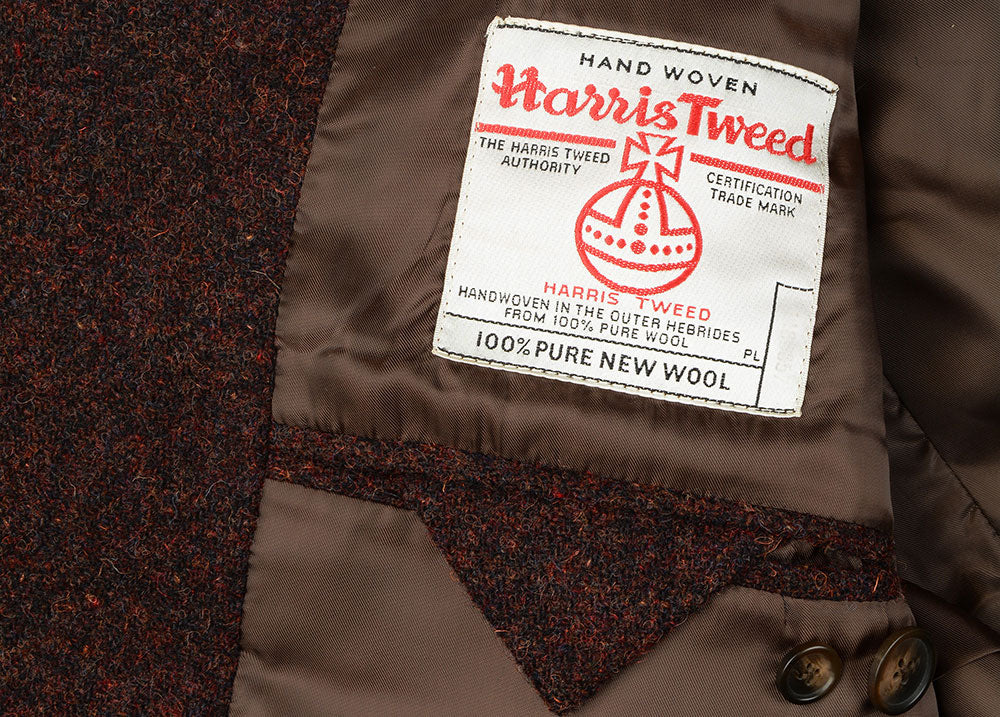The Scoop on Harris Tweed Jackets
Harris Tweed jackets are jackets made of genuine Harris Tweed fabric. From cotton and corduroy to linen and polyester, men's jackets are available in many different fabrics. But Harris Tweed is particularly popular because of its stylish appearance and high quality characteristics. Consisting of virgin wool that's dyed and spun by islanders in the Outer Hebrides of Scotland, Harris Tweed is truly a unique fabric that's unlike any other. Harris Tweed has roots dating back several centuries. According to Wikipedia, the fabric was originally woven by crofters for personal use. Because it consisted of woven wool, it was ideal for the cold-weather climate of Scotland. This spurred a newfound popularity for Harris Tweed, however. And it wasn't long before residents were trading the prized fabric for other goods and services, laying the roots for the modern-day Harris Tweed market. In 1966, more than 7.6 million yards of the fabric were produced -- a number that has increased exponentially today. It's a little-known fact that Harris Tweed was originally called "tweel," which means "twill" in Scotland.How Harris Tweed is Made
Here are some of the common practices used in the construction of Harris Tweed. Of course, some companies may use different practices, but production normally includes the following:- Shearing -- involves shearing Chevoit and Scottish Blackface sheep to achieve pure virgin wools. These sheep are typically raised in Scotland and the UK mainland. When the winter season ends and summer begins, local communities round up the sheep so they can harvest their prized wool for use in Harris Tweed.
- Washing and Dyeing -- after the wool has been sheared, it is then washed and dyed in a variety of different colors based on the producer/company's preference.
- Blending and Carding -- another essential step in the production of Harris Tweed is blending and carding. The wool is blended by hand to achieve a desirable ratio, at which point it is then carded using a toothed machine that mixes the fibers.
- Spinning -- after the wool has been blended and carded, it is then spun.
- Warping -- arguably, one of the most important steps in the creation of Harris Tweet is warping. This involves placing warp threats in a specific order, at which point they are wound onto beams for delivery.
- Weaving -- Harris Tweed fabric is handwoven using either a double-width Bonas-Graffith loom or a single-width Hattersley loon, the latter of which is used by independent weavers. Upon finishing the weaving, the weaver will tie the end of each yarn through the heddles' eyelet.
- Finishing -- this involves returning the tweed fabric to the mill where it passes through the darners who inspect it for quality control purposes. If any flaws are discovered, the fabric is either corrected or placed to the side for other purposes. Harris Tweed maintains strict control guidelines to ensure that all of its fabrics are of the highest quality.

The bottom line is that Harris Tweed makes the perfect material for use in men's jackets. It's timeless, versatile and stylish -- a powerhouse trio that's simply not found elsewhere. It's also one of the rarest fabrics in the world, and for good reason: its attractive characteristics and qualities make it highly sought after, so many people go to great lengths to find it. You don't have to search the world far and wide to find a genuine Harris Tweed jacket, however.
Tips on Choosing a Harris Tweed Jacket:
- Only buy Harris Tweed jackets (or any garment) from a reputable vendor such as StudioSuits. There are many companies out there who attempt to sell regular fabrics and materials disguised as Harris Tweed. Don't be fooled by these sub-par imitations; choose genuine Harris Tweed by ordering your jacket here at StudioSuits.
- Pay close attention to where the arms stop. A simple way to tell if the jacket arms are too long is to place your arms by your side. If the fabric extends past your wrists, the jacket is too big.
- Custom order your Harris Tweed jacket. Don't make the mistake of buying an off-the-rack Harris Tweed jacket, as it's doubtful you'll find the perfect fit. If you order here, however, you can specify your own measurements during checkout, ensuring that your new Harris Tweed jacket fits your body perfectly.
- Consider the color. Being that Harris Tweed is such a luxurious fabric, it's usually best to choose a neutral color jacket so you can wear it for many different occasions. A taupe, tan, beige or even burgundy are all excellent choices.



